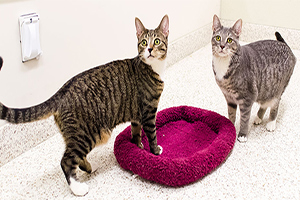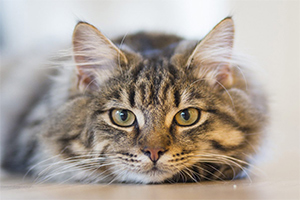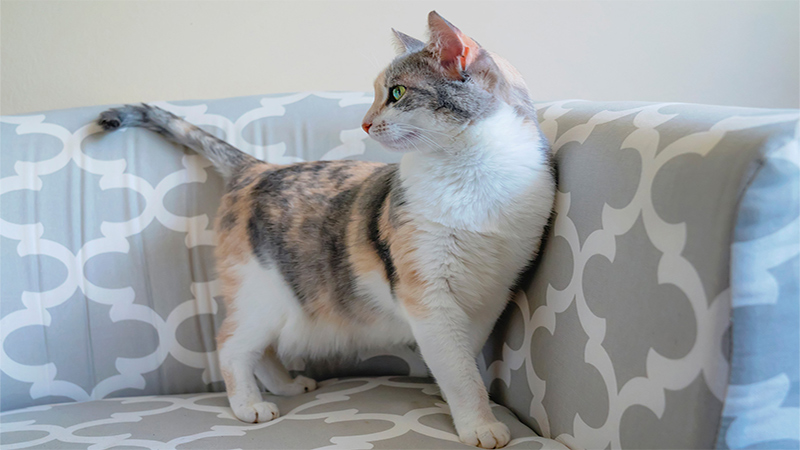Spraying is the typical cat behavior problem that most pet owners face. It is somehow irritating, especially for indoor cats. No matter how much you love your furball but you will never allow her to spray on the walls or other than the litter box.
Related Topics You Might Like:
Products Related To Topic
"(Paid Links)" ▶ As an Amazon Associate, We earn from qualifying purchases.
What Is Cat Spraying?
Similarly to how some dogs mark their territory with urine, your cat basically marks his territory by spraying. But how do urine marking and spraying differ from one another? It basically assumes the position your cat does. Cats will back up to a standing object before spraying.
It could be a chair leg, a wall, or some other piece of furniture. They extend their tail straight up and urinate. Cats who mark their territory will squat as if peeing normally and do so on a flat surface, such as your carpet or bed.
Why Do Cats Spray?
There are several reasons your cat might spray. some of them are listed below

To interact with the other cats in the home.
Cats communicate with one another by spraying uric acid. Cats are typically very solitary animals; even in homes with multiple cats, they will look for spaces to claim as their own. One cat in the house may spray urine if they believe another cat is invading their territory or attempting to take their belongings.
To interact with stray or neighborhood cats.
Indoor cats that live in an area with nearby feral cats may also spray. When there are cats outside the house, the indoor cat feels threatened in its territory and will spray to let the outside cat know the region is occupied. The purpose is to make the neighborhood cat feel less welcome.
Stress
Stress can be exacerbated by adjustments to a cat's routine or environment. While other cats may spray urine on vertical surfaces throughout the home when stressed, some cats may urinate outside the litter box. Changes in daily routine, adding new pets or family members, and activities like remodeling or construction can all lead to stress.

To attract mates.
Male cats are more likely to spray their urine, though female and neutered male cats can also do it. Intact male cats spray to communicate with nearby female cats or to attract mates. Although it's typical behavior for cats that live outside, it can be problematic if you have an intact male cat living inside. When cats reach sexual maturity, which occurs around 6 months of age, urine spraying is more likely to happen in both male and female cats. While neutered and spayed cats can still spray, the likelihood of this happening decreases if the cat is in a relaxed environment and feels that its social and emotional needs are being met.
How to stop the cat from spraying
Check you've provided enough resources.
Does your cat have everything they need, especially if you have several cats in the house? Your cat might be spraying to mark their territory if there aren't enough resources. Ensure that each cat in your home has their own litter box, bed, food and water bowl, and toys. Cat trees are the best option to ensure your pets have plenty of high and low spaces to hide in, so you should always provide them with lots of hiding spots!

Look at your litter trays.
Our cats are exceptionally clean creatures who prefer to relieve themselves in a neat, clean and easily accessible litter tray. They may begin to spray or urinate elsewhere if their toilet space isn't kept clean, difficult to access, or used by multiple cat.
Consider other cats and conflict.
Is there any cat fights going on in your home? If other cats stress out your pet, they may mark their territory or keep their urine out of anxiety. Indoor cats may experience significant stress from outside cats in your garden or passing by. You can try to keep other cats away or close the drapes and blinds so your cat won't see them.
Clean all existing spray marks
Make sure to clean up any existing spray stains in your house as soon as possible. If not, your cat will be strongly reminded to return and spray again with the smell of the marks. Make sure to clean any spray sites and maintain a fresh atmosphere in your home using an enzyme-based cleaner.
Check with the vet
Take your cat to the vet if spraying is unusual behavior for them or if it persists despite addressing other causes. Make sure to have your pet examined for any underlying health issues because some conditions can urge the cats to urinate or mark outside the litter box.

Create a reassuring environment
Does your cat have a peaceful, welcoming place they can retreat to? Without a predictable routine and a controlled environment, our cats may lash out in a stress- or anxiety-filled manner. Feeding your cat at the same time frequently, giving them regular playtime, and lavishing them with attention regularly will help create a calming environment.
Additionally, you ought to make an effort to reduce any sources of stress. New people, new pets, and even changes to your home, like decorating, can bring Kitty stress.

